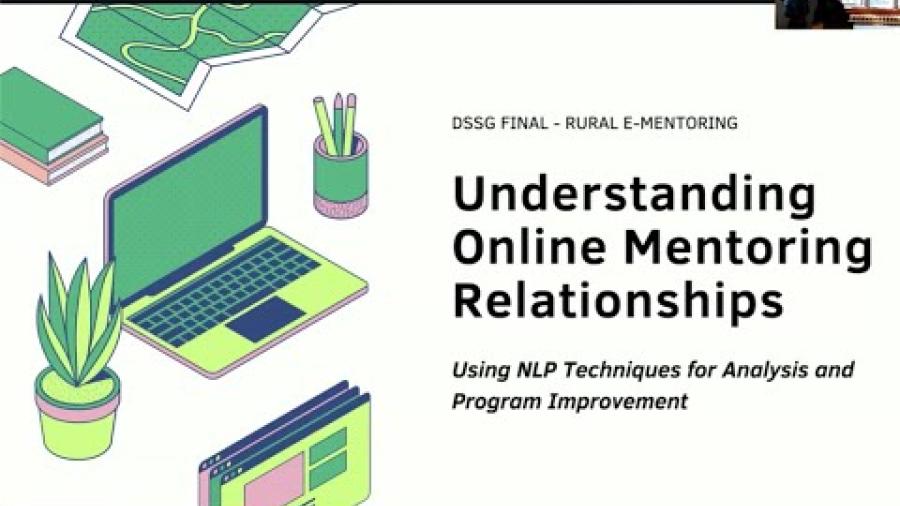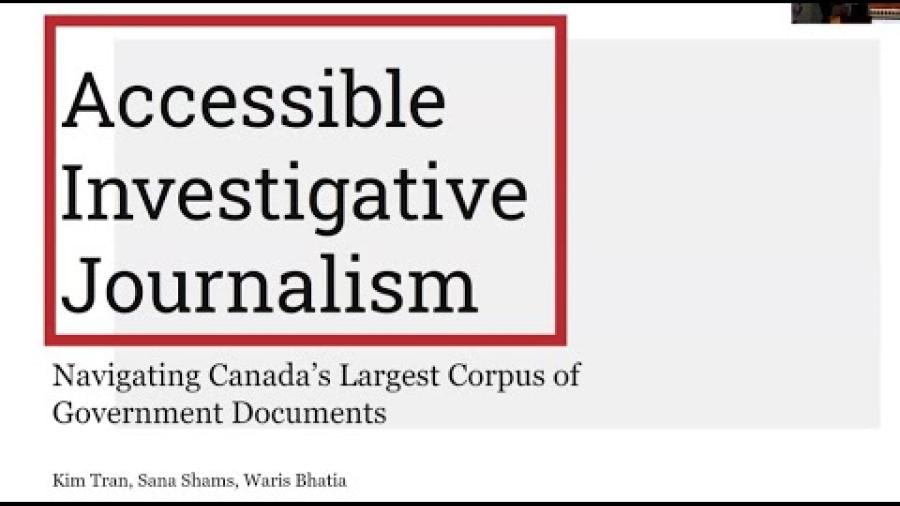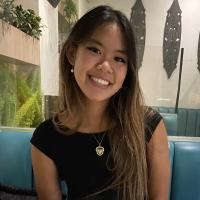The 2024 Data Science for Social Good (DSSG) program was made possible with the support from the UBC Faculty of Science and CIFAR, and through project partnerships with the Investigative Journalism Foundation and Rural eMentoring BC.
2024 Projects
Understanding Online Mentoring Relationships: Using NLP Techniques for Analysis and Program Improvement
Description: Rural eMentoring BC fosters brighter futures for youth in rural, underserved, and indigenous communities by connecting them with online mentors. Most mentorship programs only evaluate their success through optional surveys throughout their program, reducing access to data related to the development of relationships. However, ReMBC has access to all the messages exchanged through their platform by maintaining conversational data between mentor-mentee pairs, providing a unique opportunity to produce novel insights into successful e-mentoring relationship factors. By fine-tuning a LLM with text conversations from 1000+ mentor-mentee pairs, we can achieve a better understanding of the content and dynamics of successful relationships. Our plan is to deploy a user-friendly application with NLP tools including topic modeling, sentiment analysis, abstractive summarization, mood detection, and question-answering for domain-specific researchers to easily analyze incoming data. Finally, our research project can aid with curriculum design, mentor training, and sustainable relationship development for ReMBC and other eMentoring programs.
Final Presentation:

Accessible Investigative Journalism: Navigating Canada’s Largest Corpus of Government Documents
Description: The Investigative Journalism Foundation (IJF) is a nonpartisan newsroom dedicated to public-interest journalism, hosting several databases on lobbying data, political donations, and financial reports. With a mission to promote accountability and transparency within Canada’s democracy, the IJF aims to make government records more accessible to the public. Notably, IJF’s “Open By Default” dataset is Canada’s largest corpus of government documents, encompassing all Access To Information and Privacy (ATIP) requests submitted by citizens and the corresponding government responses. This project aims to enhance the navigation of this dataset by employing large language models (LLM) to vectorize the text, facilitating semantic search and topic modelling. Furthermore, the project plans to develop a Retrieval Augmented Generation (RAG) LLM pipeline, enabling the creation of a chatbot that can interact with the dataset to provide tailored, context-rich responses to user queries. This initiative will significantly improve the accessibility and interpretability of the dataset, allowing for inclusive access for Canadians from all backgrounds.
Final Presentation:

2024 Fellows

Makafui Amouzouvi
Makafui is in her fourth year studying Computer Science, intending to minor in Data Science. She is a 4-times consecutive UBC Vantage One Excellence Award recipient and is currently the only student from her country (Togo) at UBC. She is interested in applying statistical inference and LLM to different fields like communications and media. Specifically, she wants to leverage her skills in machine learning to help combat misinformation and disinformation in the media.
As a DSSG fellow, she is hoping to leverage her skills to develop innovative solutions and contribute to making a difference in society. Outside of school and work, Makafui also loves discovering restaurants, and can provide you with a list of the 10 best hidden gems in Vancouver.

Waris Bhatia
Waris (he/him) is a senior undergraduate student pursuing an accelerated Bachelor's in Computer Science. He has previous academic and industry experience working in life sciences research. His interests lie in game theory, Natural Language Processing, and Computer Vision. He is eager to hone his research skills and learn exciting Machine Learning techniques this summer. He looks forward to working with like-minded people in the DSSG program to address a real-life problem. This summer, Waris also hopes to spare some time to kayak and hike with friends.

Tiffany Chu
Tiffany has recently graduated with a degree in Cognitive Systems and a minor in Commerce. Her research interests focus on autonomous problem-solving processes and learning, driven by her intrigue with economic and cognitive principles in decision-making. As a DSSG fellow, she hopes to apply her research experience, get inspired, and implement data-driven solutions to make an impact on society. Lastly, she seeks to utilize her interdisciplinary background to bridge gaps in diverse fields and develop innovative solutions. Tiffany can be found cloud-watching outside, in the gym, or tending to her plants.

Jonah Curl
Jonah is a Bachelor of Computer Science After Degree student. His degree has given him the opportunity to learn more about machine learning, to delve into its applications and to gain inspiration for new ways it can be used. He competed in a hackathon recently where he used computer vision and a random forests model to create a new way to play classic games such as Super Mario Bros more interactively through body movements instead of a controller.
Through DSSG, he is eager to further develop his skills as a data scientist and gain valuable experience in a real-world setting.

Sana Shams
Sana is a third-year student majoring in Cognitive Systems with a minor in Data Science who is passionate about machine learning and data science through the lens of ethical and social impact. She is interested in working to dissect data-driven solutions for social applications to identify risks for bias, algorithm traceability, and disproportionate impacts. Sana has been involved as a Machine Learning Fellow through the AI4Good Lab with the Alberta Machine Intelligence Institute, and is currently an intern at Nautical Crime Investigation Services which applies AI solutions to the maritime crime domain.
As a DSSG Fellow, Sana is committed to leveraging equitable and responsible data science solutions.

Kim Tran
Kim is a third year undergraduate student pursuing a major in Computer Science and a minor in Data Science. She is passionate about interdisciplinary applications of technology and aims to develop software to create more equitable and accessible opportunities. While a software engineering intern at Optum, she helped deliver solutions for radiology systems used in hospitals around the globe. As a DSSG fellow, she looks forward to leveraging her background in computer science and refining her research skills and statistical knowledge.
Through the program, she is eager for the opportunity to work on data science solutions with a positive social impact. Outside of work, Kim enjoys trying new recipes, playing volleyball, and spending time outdoors.